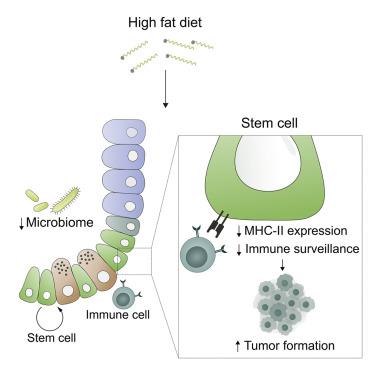Cell Stem Cell ( IF 19.8 ) Pub Date : 2021-09-15 , DOI: 10.1016/j.stem.2021.08.007 Semir Beyaz 1 , Charlie Chung 2 , Haiwei Mou 2 , Khristian E Bauer-Rowe 3 , Michael E Xifaras 4 , Ilgin Ergin 2 , Lenka Dohnalova 5 , Moshe Biton 6 , Karthik Shekhar 7 , Onur Eskiocak 2 , Katherine Papciak 2 , Kadir Ozler 2 , Mohammad Almeqdadi 3 , Brian Yueh 2 , Miriam Fein 2 , Damodaran Annamalai 8 , Eider Valle-Encinas 3 , Aysegul Erdemir 3 , Karoline Dogum 3 , Vyom Shah 2 , Aybuke Alici-Garipcan 2 , Hannah V Meyer 2 , Deniz M Özata 9 , Eran Elinav 10 , Alper Kucukural 11 , Pawan Kumar 12 , Jeremy P McAleer 13 , James G Fox 8 , Christoph A Thaiss 5 , Aviv Regev 14 , Jatin Roper 15 , Stuart H Orkin 16 , Ömer H Yilmaz 17

|
Little is known about how interactions of diet, intestinal stem cells (ISCs), and immune cells affect early-stage intestinal tumorigenesis. We show that a high-fat diet (HFD) reduces the expression of the major histocompatibility complex class II (MHC class II) genes in intestinal epithelial cells, including ISCs. This decline in epithelial MHC class II expression in a HFD correlates with reduced intestinal microbiome diversity. Microbial community transfer experiments suggest that epithelial MHC class II expression is regulated by intestinal flora. Mechanistically, pattern recognition receptor (PRR) and interferon-gamma (IFNγ) signaling regulates epithelial MHC class II expression. MHC class II-negative (MHC-II−) ISCs exhibit greater tumor-initiating capacity than their MHC class II-positive (MHC-II+) counterparts upon loss of the tumor suppressor Apc coupled with a HFD, suggesting a role for epithelial MHC class II-mediated immune surveillance in suppressing tumorigenesis. ISC-specific genetic ablation of MHC class II increases tumor burden cell autonomously. Thus, HFD perturbs a microbiome-stem cell-immune cell interaction that contributes to tumor initiation in the intestine.
中文翻译:

饮食抑制肠上皮细胞中 MHC II 类表达可增强肠肿瘤发生
关于饮食、肠道干细胞 (ISC) 和免疫细胞如何影响早期肠道肿瘤发生的相互作用知之甚少。我们表明,高脂饮食 (HFD) 可降低肠上皮细胞(包括 ISC)中主要组织相容性复合体 II 类(MHC II 类)基因的表达。HFD 中上皮 MHC II 类表达的下降与肠道微生物群多样性降低有关。微生物群落转移实验表明上皮 MHC II 类表达受肠道菌群的调节。机制上,模式识别受体 (PRR) 和干扰素-γ (IFNγ) 信号调节上皮 MHC II 类表达。MHC II 类阴性 (MHC-II-) ISC 在失去肿瘤抑制因子 Apc 和 HFD 后表现出比其 MHC II 类阳性 (MHC-II+) 对应物更大的肿瘤启动能力,表明上皮 MHC 类的作用II介导的免疫监视抑制肿瘤发生。MHC II 类的 ISC 特异性基因消融会自主增加肿瘤负荷细胞。因此,HFD 扰乱了微生物组 - 干细胞 - 免疫细胞的相互作用,这有助于肠道中肿瘤的发生。









































 京公网安备 11010802027423号
京公网安备 11010802027423号